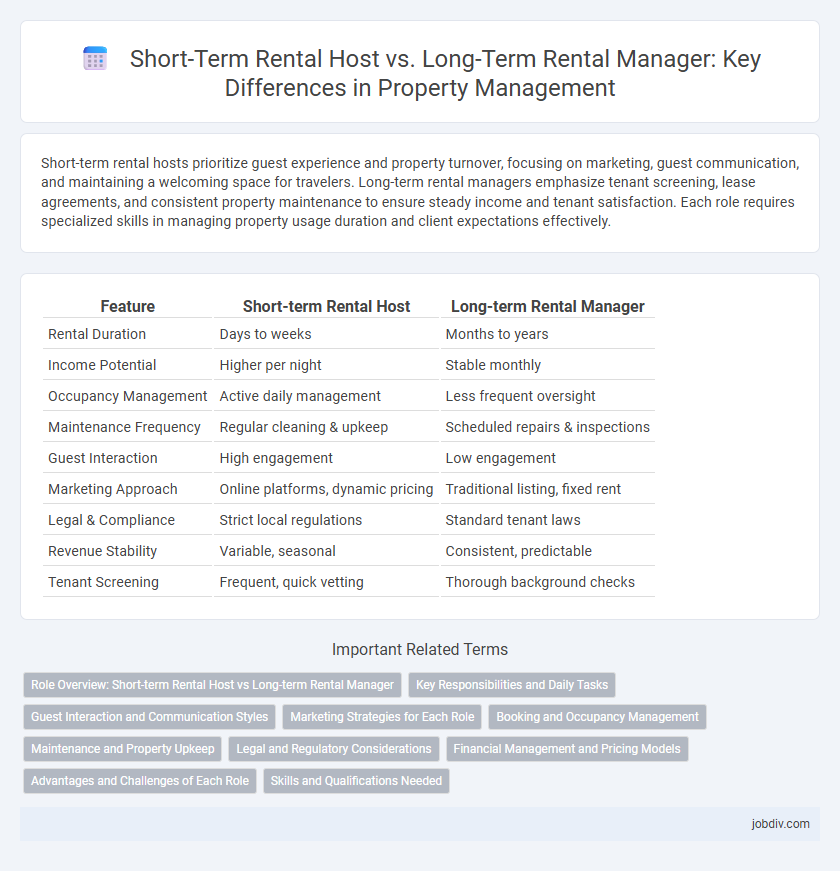Short-term rental hosts prioritize guest experience and property turnover, focusing on marketing, guest communication, and maintaining a welcoming space for travelers. Long-term rental managers emphasize tenant screening, lease agreements, and consistent property maintenance to ensure steady income and tenant satisfaction. Each role requires specialized skills in managing property usage duration and client expectations effectively.
Table of Comparison
| Feature | Short-term Rental Host | Long-term Rental Manager |
|---|---|---|
| Rental Duration | Days to weeks | Months to years |
| Income Potential | Higher per night | Stable monthly |
| Occupancy Management | Active daily management | Less frequent oversight |
| Maintenance Frequency | Regular cleaning & upkeep | Scheduled repairs & inspections |
| Guest Interaction | High engagement | Low engagement |
| Marketing Approach | Online platforms, dynamic pricing | Traditional listing, fixed rent |
| Legal & Compliance | Strict local regulations | Standard tenant laws |
| Revenue Stability | Variable, seasonal | Consistent, predictable |
| Tenant Screening | Frequent, quick vetting | Thorough background checks |
Role Overview: Short-term Rental Host vs Long-term Rental Manager
Short-term rental hosts primarily handle guest communication, property preparation, and booking management to ensure a seamless and personalized stay experience. Long-term rental managers oversee tenant screening, lease agreements, rent collection, and property maintenance to maintain consistent occupancy and compliance. Both roles require strong organizational skills but differ significantly in tenant interaction frequency and management scope.
Key Responsibilities and Daily Tasks
Short-term rental hosts handle guest communication, property preparation, and rapid turnover to maximize occupancy and guest satisfaction. Long-term rental managers focus on tenant screening, lease enforcement, and property maintenance to ensure stable occupancy and consistent rental income. Both roles require effective problem-solving and financial oversight but differ in time commitment and operational priorities.
Guest Interaction and Communication Styles
Short-term rental hosts prioritize frequent, personalized guest interaction through instant messaging platforms, fostering a welcoming atmosphere and addressing immediate needs. Long-term rental managers emphasize structured, formal communication, often relying on scheduled meetings or official channels to maintain professional landlord-tenant relationships. Effective guest communication in short-term rentals enhances guest satisfaction, while consistent updates and clear policies in long-term rentals ensure transparency and tenant retention.
Marketing Strategies for Each Role
Short-term rental hosts rely heavily on dynamic pricing tools, social media campaigns, and platform-specific promotions like Airbnb or Vrbo to attract quick bookings and maximize occupancy. Long-term rental managers focus on tenant retention through targeted advertising on real estate sites, lease incentives, and building strong local community relationships to ensure steady, reliable income. Both roles leverage online listings and reviews but tailor marketing strategies based on rental duration and tenant expectations.
Booking and Occupancy Management
Short-term rental hosts excel in dynamic booking strategies, leveraging frequent turnover to maximize occupancy rates through platforms like Airbnb and VRBO. Long-term rental managers prioritize stable occupancy by securing extended leases, reducing vacancy periods, and managing tenant retention effectively. Advanced property management software aids both roles by optimizing scheduling, automating bookings, and tracking occupancy metrics to enhance overall rental performance.
Maintenance and Property Upkeep
Short-term rental hosts must frequently address immediate maintenance issues due to high guest turnover, requiring rapid response to ensure positive reviews and guest satisfaction. Long-term rental managers focus on routine property upkeep and preventative maintenance to preserve property value and reduce long-term repair costs. Efficient maintenance strategies in short-term rentals often involve specialized cleaning services and quick repairs, while long-term rentals prioritize scheduled inspections and durable improvements.
Legal and Regulatory Considerations
Short-term rental hosts must comply with strict local zoning laws, transient occupancy taxes, and frequent permit renewals, while long-term rental managers face complex landlord-tenant regulations, including lease agreements and eviction procedures. Regulatory frameworks often impose limits on rental duration and occupancy standards, impacting liability and insurance requirements for both types of rentals. Understanding municipality-specific compliance and fair housing laws is crucial to avoid fines and legal disputes in either rental model.
Financial Management and Pricing Models
Short-term rental hosts typically implement dynamic pricing models using data-driven tools to maximize nightly rates and occupancy, adapting quickly to market demand fluctuations. Long-term rental managers favor stable, fixed monthly rent agreements that ensure consistent cash flow and simplified financial forecasting. Effective financial management for short-term rentals involves frequent expense tracking and revenue optimization, while long-term rentals focus on minimizing vacancies and reliable tenant payment schedules.
Advantages and Challenges of Each Role
Short-term rental hosts benefit from higher nightly rates and flexibility in property use but face challenges such as frequent guest turnover and stringent local regulations. Long-term rental managers enjoy stable income streams and reduced vacancy risks but must handle tenant relations and property maintenance over extended periods. Both roles require distinct management skills tailored to maximizing revenue while addressing their specific operational demands.
Skills and Qualifications Needed
Short-term rental hosts excel in customer service, marketing, and quick problem-solving, often leveraging platforms like Airbnb to maximize occupancy. Long-term rental managers require expertise in property maintenance, tenant screening, lease agreements, and compliance with housing laws. Both roles demand strong communication and organizational skills but differ significantly in day-to-day focus and regulatory knowledge.
Short-term Rental Host vs Long-term Rental Manager Infographic

 jobdiv.com
jobdiv.com